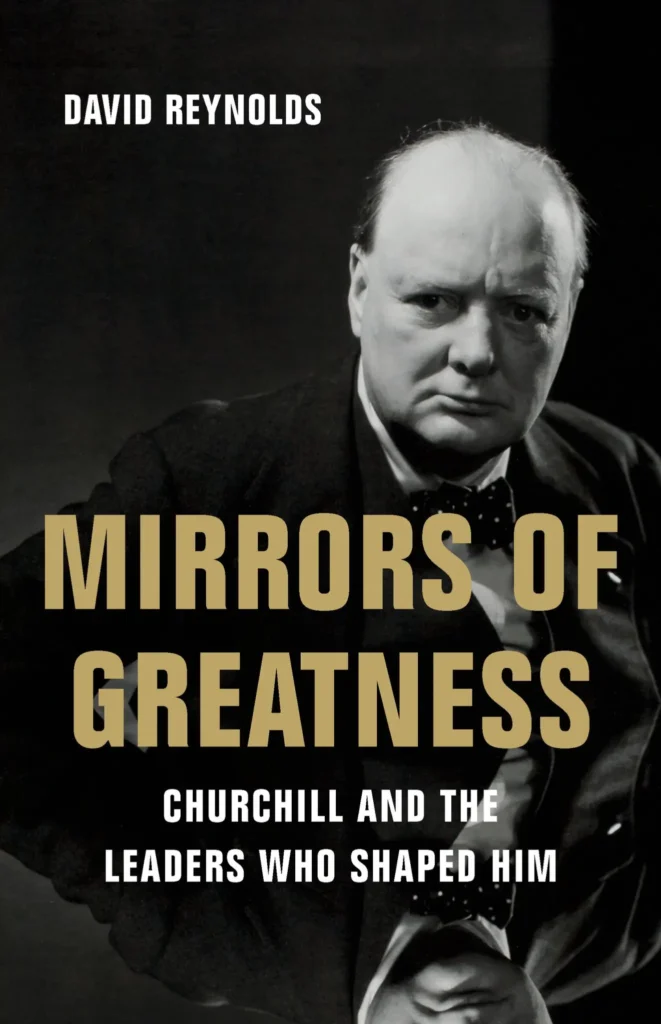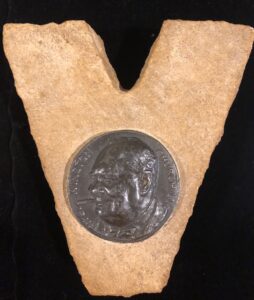Bulletin #190 — Mar 2024
The First Eleven

To view in full, right click and choose "Open in New Window"
February 26, 2024
David Reynolds, Mirrors of Greatness: Churchill and the Leaders Who Shaped Him, William Collins, 2023 (UK), Basic Books, 2024 (US), 464 pages, £25.00/$32.50. ISBN 978–1541620209
Review by W. Mark Hamilton
Historian David Reynolds has written an engaging series of biographic essays that together make a unique contribution to Winston Churchill’s historiography. Reynolds examines eleven judiciously selected individuals with whom Churchill worked during his long life. While Churchill considered each of them “great” in some way, not all would likely have returned the favor; some opposed Churchill’s ideals and his place in history.
Churchill sought greatness for himself and looked for it in others, as when he wrote Great Contemporaries in 1937. Mirrors of Greatness is a satisfying counterpart. Reynolds primarily focuses on men close to Churchill at the summit of his career, especially during the Second World War. Churchill consciously measured himself against these men, determined that he, too, would leave his mark on history—and then write that history.
Appropriately, Reynolds begins with an essay about Churchill’s father, Lord Randolph, whom the son idolized his entire life. Lord Randolph was also the subject of a two-volume biography published by Winston in 1906, which was extremely well-received and showcased the younger Churchill’s literary talents.

2025 International Churchill Conference
Churchill’s early political colleague, mentor and patron, David Lloyd George, is the subject of the next essay. For most of their lives, the two were extremely close, even though Lloyd George was eleven years older, and the men were from sharply different social classes. Both were called “men in a hurry,” especially when they worked together to introduce radical social reforms.
The chapter on Neville Chamberlain shows an individual with whom Churchill’s relationship was mixed. Though both were Conservatives, they had deep divisions on foreign policy, which ultimately resulted in Churchill replacing Chamberlain as prime minister. Chamberlain and Stanley Baldwin, a fellow Conservative and three-time prime minister, worked hard to keep Churchill out of government in the 1930s. They were not alone in regarding Churchill as erratic and untrustworthy, while Churchill considered both men naïve about Nazi Germany. Reynolds devotes considerable attention to Chamberlain’s mistakes and eventual downfall. For Churchill, Chamberlain became a rather pathetic figure.
Churchill despised Benito Mussolini and Adolf Hitler for the harm they wreaked during the Second World War. Yet, ironically, the two dictators made it possible for Churchill to reach the summit of his ambition. Reynolds paints a compelling picture of Churchill’s different attitudes toward these two Axis leaders. In Churchill’s view, Mussolini had a promising start but became “a great man gone wrong.” Churchill had a strong love for the Roman Empire of antiquity and Italy had been an ally in the First World War, but his initial hopes that Mussolini could be a possible bulwark for protecting British interests in Egypt and the wider Mediterranean were dashed in 1940 when Italy joined the war against the Allies. As for Hitler, Churchill had a strong personal dislike for the man whom he called a “monster of wickedness” in a 1941 broadcast. Churchill had little interest in German culture, but he respected German military might. Germany’s defeat of the French was one of the great shocks of Churchill’s life.
No political relationship was more vital to Churchill than the one he shared with US President Franklin Roosevelt, his chief partner in the Second World War. Despite the significance of the relationship, Roosevelt was not an admirer of the British Empire. He saw Churchill as being “stuck” in the past and having a mindset more in tune with the Victorian era in which he was born than the modern era and its new challenges. The Churchill–Roosevelt relationship was not always constant. After 1943, Roosevelt became the “senior partner,” as British influence waned and the American president paid more attention to the increasingly powerful Soviet Union.
Churchill found Joseph Stalin to be strong and realistic, but also a man of many moods with a complex personality. As the Soviet Union suffered colossal military and civilian losses, Stalin pressed Churchill to start a Western Front against Germany, an unrealistic demand before 1944, causing the Prime Minister to fear the possibility of the Russians making a separate peace with Germany. But the promise of certain Allied victory after D-Day led Churchill to understand that the Soviet Union would emerge as a serious threat to democracy and capitalism. Reynolds contends that Stalin could charm Churchill at times and become a “blind spot” for the British prime minister.
It is Mohandas Gandhi, according to Reynolds, who caused Churchill the most anxiety. Not only was Gandhi’s promotion of Indian independence from the British Empire anathema to Churchill, but Gandhi’s personal philosophy and appearance were abhorrent to Churchill. The Hindu leader possessed the “power of the powerless,” which Churchill did not understand as a military man and believer in personal strength. Churchill’s vocabulary did not include “passive” and “non-resistance.” A man of power, Churchill felt that the Indian leader was betraying the values of the British Empire.
Another personality whose fundamental beliefs Churchill could not fathom was Labor leader Clement Attlee, who took over as prime minister in 1945 with a mandate to change Britain through massive social reform. Attlee did not share Churchill’s view that Britain was “great” because of the empire, but Attlee nonetheless was a patriot who acted to protect Britain’s global interests, including the production of an atomic bomb. The distinctly different social backgrounds of the two men did not cause all of their clashes, but, as Reynolds observes, “Attlee was a political foot-soldier who climbed through the ranks to become an officer [while] Churchill had been a field marshal since childhood.”
Reynolds’ essay on French President Charles de Gaulle, who led the Free French Forces during the Second World War, reveals a personality much like Churchill’s. Even though relations between the two was difficult at times, Reynolds contends that there was mutual admiration. Just as de Gaulle saw himself as the personification of France, so Churchill saw himself as mirroring Great Britain. Churchill understood de Gaulle’s deeply wounded pride at the wartime defeat of France and its national humiliation.
In a graceful bracketing of the essays, which began with Reynolds’ thoughts about Churchill’s relationship with his father, Reynolds ends the book with an essay featuring Churchill’s wife, Clementine. Reynolds portrays Clementine Churchillas a major factor in her husband’s personal and professional success. Their marriage survived until Churchill’s death in 1965, but it was not without challenges and periods of stress. Still, Churchill had no better supporter, and Clementine was a partner who understood his complex personality.
Mirrors of Greatness is a stellar addition to the body of work on Churchill. Reynolds has made the book even more inviting by citing the work of contemporary Churchill scholars throughout each of his essays. This feature allows the reader to consult other Churchill authors, all of whom are distinguished in the field. This up-to-date bibliography, like the entire book, is a pleasure to peruse.
W. Mark Hamilton is author of The Nation and the Navy: Methods and Organization of British Navalist Propaganda, 1889–1914 (1986).
Subscribe
WANT MORE?
Get the Churchill Bulletin delivered to your inbox once a month.






